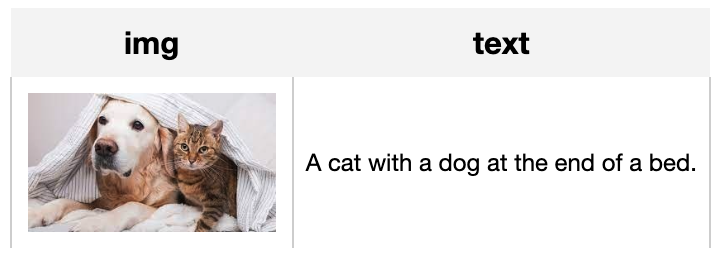
copied
Readme
Files and versions
3.2 KiB
Image Captioning with MAGIC
author: David Wang
Description
This operator generates the caption with MAGIC which describes the content of the given image. MAGIC is a simple yet efficient plug-and-play framework, which directly combines an off-the-shelf LM (i.e., GPT-2) and an image-text matching model (i.e., CLIP) for image-grounded text generation. During decoding, MAGIC influences the generation of the LM by introducing a CLIP-induced score, called magic score, which regularizes the generated result to be semantically related to a given image while being coherent to the previously generated context. This is an adaptation from yxuansu / MAGIC.
Code Example
Load an image from path './image.jpg' to generate the caption.
Write a pipeline with explicit inputs/outputs name specifications:
from towhee import pipe, ops, DataCollection
p = (
pipe.input('url')
.map('url', 'img', ops.image_decode.cv2_rgb())
.map('img', 'text', ops.image_captioning.magic(model_name='magic_mscoco'))
.output('img', 'text')
)
DataCollection(p('./image.jpg')).show()

Factory Constructor
Create the operator via the following factory method
magic(model_name)
Parameters:
model_name: str
The model name of MAGIC. Supported model names:
- magic_mscoco
Interface
An image captioning operator takes a towhee image as input and generate the correspoing caption.
Parameters:
data: towhee.types.Image (a sub-class of numpy.ndarray)
The image to generate caption.
Returns: str
The caption generated by model.
More Resources
- Multimodal RAG locally with CLIP and Llama3 - Zilliz blog: A tutorial walks you through how to build a multimodal RAG with CLIP, Llama3, and Milvus.
- Supercharged Semantic Similarity Search in Production - Zilliz blog: Building a Blazing Fast, Highly Scalable Text-to-Image Search with CLIP embeddings and Milvus, the most advanced open-source vector database.
- The guide to clip-vit-base-patch32 | OpenAI: clip-vit-base-patch32: a CLIP multimodal model variant by OpenAI for image and text embedding.
- An LLM Powered Text to Image Prompt Generation with Milvus - Zilliz blog: An interesting LLM project powered by the Milvus vector database for generating more efficient text-to-image prompts.
- From Text to Image: Fundamentals of CLIP - Zilliz blog: Search algorithms rely on semantic similarity to retrieve the most relevant results. With the CLIP model, the semantics of texts and images can be connected in a high-dimensional vector space. Read this simple introduction to see how CLIP can help you build a powerful text-to-image service.
3.2 KiB
Image Captioning with MAGIC
author: David Wang
Description
This operator generates the caption with MAGIC which describes the content of the given image. MAGIC is a simple yet efficient plug-and-play framework, which directly combines an off-the-shelf LM (i.e., GPT-2) and an image-text matching model (i.e., CLIP) for image-grounded text generation. During decoding, MAGIC influences the generation of the LM by introducing a CLIP-induced score, called magic score, which regularizes the generated result to be semantically related to a given image while being coherent to the previously generated context. This is an adaptation from yxuansu / MAGIC.
Code Example
Load an image from path './image.jpg' to generate the caption.
Write a pipeline with explicit inputs/outputs name specifications:
from towhee import pipe, ops, DataCollection
p = (
pipe.input('url')
.map('url', 'img', ops.image_decode.cv2_rgb())
.map('img', 'text', ops.image_captioning.magic(model_name='magic_mscoco'))
.output('img', 'text')
)
DataCollection(p('./image.jpg')).show()

Factory Constructor
Create the operator via the following factory method
magic(model_name)
Parameters:
model_name: str
The model name of MAGIC. Supported model names:
- magic_mscoco
Interface
An image captioning operator takes a towhee image as input and generate the correspoing caption.
Parameters:
data: towhee.types.Image (a sub-class of numpy.ndarray)
The image to generate caption.
Returns: str
The caption generated by model.
More Resources
- Multimodal RAG locally with CLIP and Llama3 - Zilliz blog: A tutorial walks you through how to build a multimodal RAG with CLIP, Llama3, and Milvus.
- Supercharged Semantic Similarity Search in Production - Zilliz blog: Building a Blazing Fast, Highly Scalable Text-to-Image Search with CLIP embeddings and Milvus, the most advanced open-source vector database.
- The guide to clip-vit-base-patch32 | OpenAI: clip-vit-base-patch32: a CLIP multimodal model variant by OpenAI for image and text embedding.
- An LLM Powered Text to Image Prompt Generation with Milvus - Zilliz blog: An interesting LLM project powered by the Milvus vector database for generating more efficient text-to-image prompts.
- From Text to Image: Fundamentals of CLIP - Zilliz blog: Search algorithms rely on semantic similarity to retrieve the most relevant results. With the CLIP model, the semantics of texts and images can be connected in a high-dimensional vector space. Read this simple introduction to see how CLIP can help you build a powerful text-to-image service.
